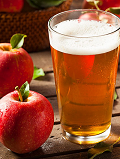I missed last week due to being on vacation in Mexico, yay! I gave some thought to writing about the amazing number of words in Mexican Spanish that originate in indigenous terms—mostly Nahuatl, the language of the Aztecs a.k.a. the Mexica. But vacation got the better of me, so any writing I do about, say, mole de guajalote with aguacate and huitlacoche will just have to be for another time.
For today's new-to-me word I want to offer the term prepone. This isn't actually new-new to me, but it came up again recently in a work conversation. This is a handy word that addresses the following situation:
Colleague: I need to move Friday's meeting forward an hour.
You: Do you mean "forward" as in earlier or "forward" as in later?
The word prepone is unambiguous here, because it's the opposite of postpone:
Colleague: I need to prepone Friday's meeting an hour.
You: Cool.
 The word prepone became popular in South Asian English sometime in the 1970s or thereabouts. People have noticed the term—the Christian Science Monitor wrote about it more than once, and the lexicographer Ben Zimmer mentioned it in a column about terms from South Asian English. It's such a self-evidently useful term that it's really surprising that it hasn't gotten more traction in other Englishes. I certainly will do my best to promote it, and I encourage you to use it as well.
The word prepone became popular in South Asian English sometime in the 1970s or thereabouts. People have noticed the term—the Christian Science Monitor wrote about it more than once, and the lexicographer Ben Zimmer mentioned it in a column about terms from South Asian English. It's such a self-evidently useful term that it's really surprising that it hasn't gotten more traction in other Englishes. I certainly will do my best to promote it, and I encourage you to use it as well.
For origins, I got interested in the term cider. A Grammar Girl column noted that apple cider is a redundancy, because cider is made from apples. That seems to be true; if you go to a saloon and ask for cider, you'll almost certainly get a drink made with apples. (Hold that thought.)
 The word has a slightly curious history. In Latin translations of the Old Testament, the word sicera and a similar word in Greek were used for a Hebrew word (shekar) that meant "intoxicating drink." So the most original sense of the term just meant what today we'd refer to as the hard stuff. By medieval times, the word had narrowed to mean the fermented juice of apples or pears. It then came to mean the juice pressed from apples, whether that had been fermented or not. We're therefore obliged to add a qualifier to the word cider if there's ambiguity: sweet cider or hard cider.
The word has a slightly curious history. In Latin translations of the Old Testament, the word sicera and a similar word in Greek were used for a Hebrew word (shekar) that meant "intoxicating drink." So the most original sense of the term just meant what today we'd refer to as the hard stuff. By medieval times, the word had narrowed to mean the fermented juice of apples or pears. It then came to mean the juice pressed from apples, whether that had been fermented or not. We're therefore obliged to add a qualifier to the word cider if there's ambiguity: sweet cider or hard cider.
In the world of craft brewing, you can find pear cider, which technically means that not all cider is from apples, and that apple cider isn't necessarily a redundancy. But if you want a cider made from pears, you'll probably want to be explicit with the barkeep. What you can't do is use the word cider to mean any old strong drink, as you might be etymologically justified in doing, ha.
Like this? Read all the Friday words.
 |
|

 |
|
